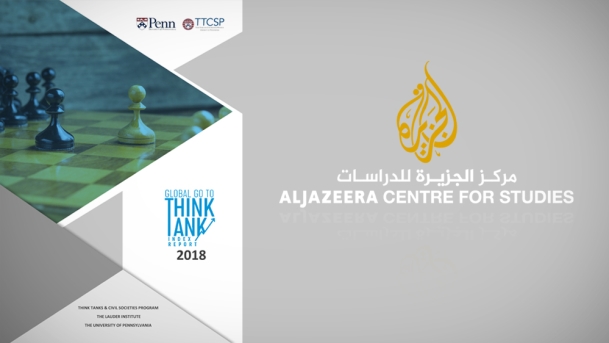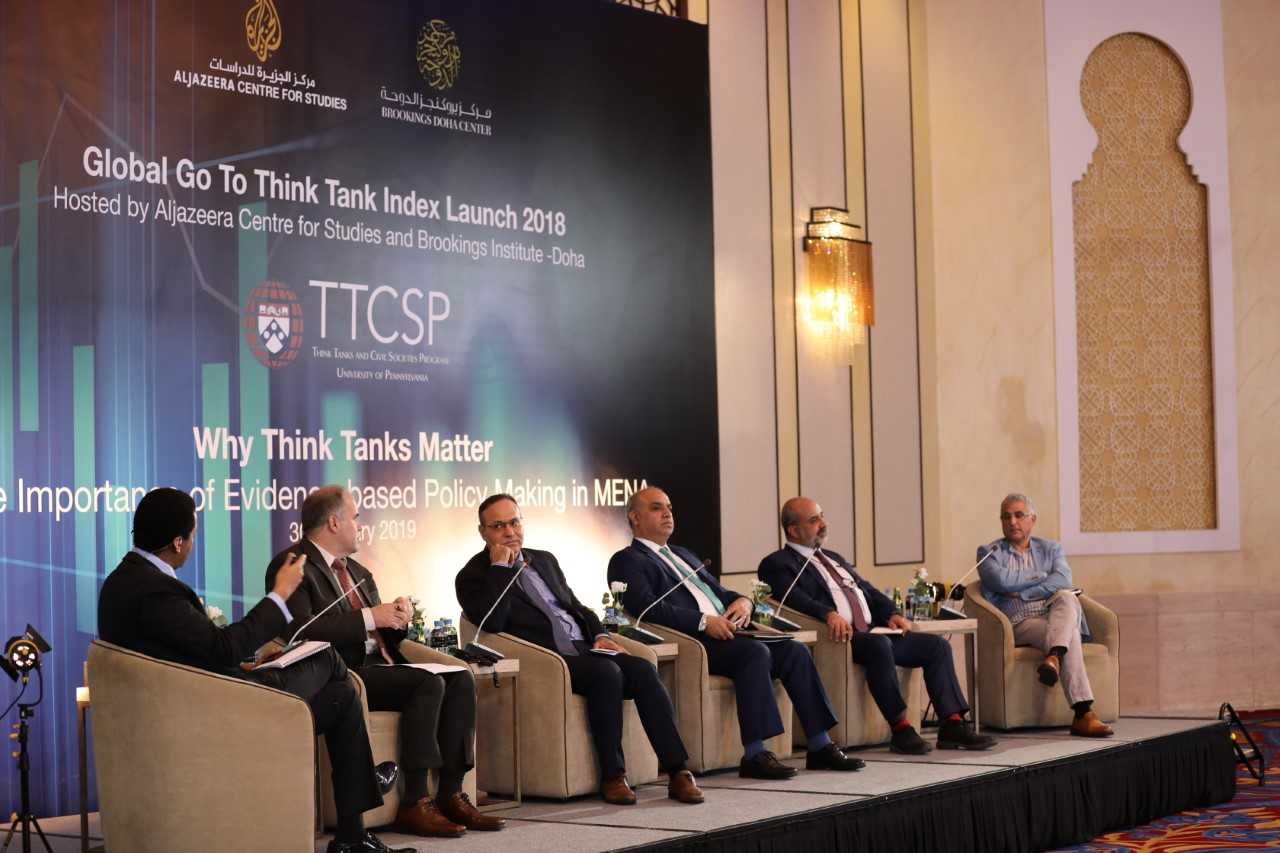
According to the University of Pennsylvania’s 2018 Global Go To Think Tank Index (GGTTI), Al Jazeera Centre for Studies (AJCS) came fifth in the rankings of the best think tanks in the Arab world, and 143rd in the Top Think Tanks Worldwide (Non-US) category. AJCS also ranked in the 57th position among the best 70 global think tanks applying best quality assurance and integrity policies and procedures. The list included 8162 think tanks including 479 from the Middle East and North Africa (MENA) region. AJCS has maintained its fifth ranking position among the most influential research centres in the MENA region for the fifth consecutive year.
Launched in 2006, the GGTTTI marks its thirteenth year of continued efforts by the University of Pennsylvania’s Think Tanks and Civil Societies Program (TTCSP) to acknowledge the important contributions and emerging global trends of think tanks worldwide. It also focuses on “Researching the trends and challenges facing think tanks, policy makers, and policy-oriented civil society groups... Sustaining, strengthening, and building capacity for think tanks around the world... Maintaining the largest, most comprehensive database of over 8,100 think tanks,” said Dr. James G. McGann, International Studies Director Think Tanks and Civil Societies Program, The Lauder Institute University of Pennsylvania.
Aljazeera Centre for Studies and the Brookings Doha Centre hosted a public discussion “Why Think Tanks Matter: The Importance of Evidence-based Policy in MENA” in Doha January 30, 2019. The panelists included Dr. Ezzeddine Abdelmola, research director at Aljazeera Center for Studies; Dr. Nader Kabbani, research director at the Brookings Doha Center; Dr. Mahjoub Zweiri, director of Gulf Studies at Qatar University; Dr. Mohamed Masri, executive director at the Arab Center for Research and Policy Analysis; and Dr. Sari Hanafi, professor of Sociology at the American University in Beirut.
The discussion focused on the main challenges of the potential contribution of the existing think tanks in the MENA region, notably the political climate and authoritarian tendencies. Dr. Abdelmoula explained how “think tanks in the Arab world face numerous challenges, some of which are related to power structures, where the decision-making processes are mostly ambiguous, personified, and rarely institutionalized.” Other panelists pointed out that these think tanks are expected to produce producing research material that is credible and can guide the decision-making process and policy making in the absence of democracy in most Arab countries.”
Dr. Kabbani and other speakers stressed the importance of the availability of information as a basis for building a solid political analysis, despite the difficulty of obtaining information in most Arab countries, unlike international research centers that can in developed countries that have free public information laws. The conference participants also noted the importance of having the ability to sort and analyze information, especially in the era of the communications revolution, the dominance of information technology, the multiplicity of sources and the difficulty of verifying its credibility. As Dr. Abdelmoula argued, “The culture of accepting independent and unbiased analyses is another issue facing think tanks in this part of the world where trust usually comes before competence.”
Dr. Zweiri highlighted the status of social sciences and humanities in the Arab region and the lack of financial resources in comparison to what is devoted to experimental and applied sciences, despite the importance of deep understanding and framing adequate visions to study political and social phenomena. The speakers concluded their discussion by emphasizing the need for bridging the gap between policy makers and the research community. They believe there could a common benefit as the policy-making and research convergence and coordination can lead to mutual trust and joint action in the future.
 |
| [Left to right]: Otman Ayfarah of Aljzeera Arabic, Nader Kabbani, research director, Brookings Doha Center; Ezzeddine Abdelmola, research director, Aljazeera Center for Studies; Mahjoub Zweiri, director of Gulf Studies at Qatar University; Mohamed Masri, executive director, Arab Center for Research and Policy Analysis; and Sari Hanafi, professor of Sociology at the American University in Beirut. [Aljazeera] |